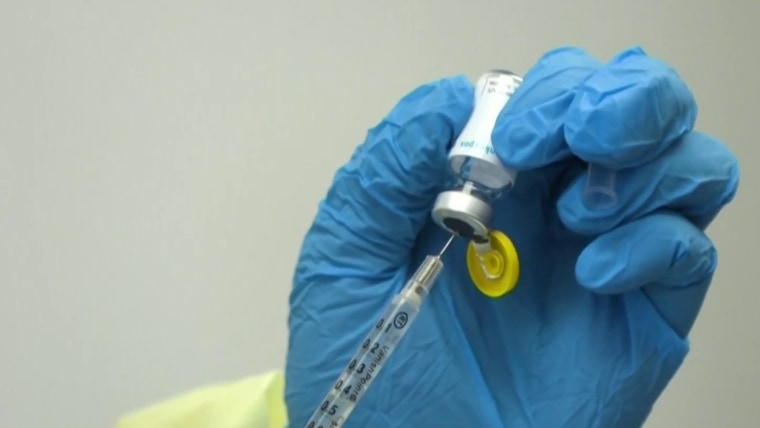Monkeypox cases are falling, but experts warn that the outbreak is not over
The number of new monkeypox cases in the United States has fallen by 40% since early August — a signal that the country’s outbreak could be abating.
According to an NBC News analysis of data from the Centers for Disease Control and Prevention, the seven-day average of new reported cases decreased from a daily average of 465 on Aug. 10, to 281 on Aug. 31.
The overall drop in cases is largely driven by falling case counts in big cities including New York City and Los Angeles.
Much of that decrease, experts say, may be attributed to conscious changes in behavior among people most at risk for monkeypox — men who have sex with men and others in their sexual networks.
Dr. Jay Varma, director of the Center for Pandemic Prevention and Response at Weill Cornell Medicine in New York City, cited research from the CDC that found a 50% drop in risky hookups. According to the New York City Department of Health, cases fell consistently throughout the month of August.
Men who have sex with men “take their health seriously,” Varma said. “This is born of experience with the HIV epidemic and intensive activism.”
The CDC reported the first cases associated with the outbreak in May. Since then, nearly 19,000 cases have been reported nationwide, with the vast majority — 16,241 — in August.
The rollout of vaccines may have also played a role in the decline. As of Aug. 30, 352,675 doses of monkeypox vaccine had been administered in areas of the country that report such data.
Cases are also falling in European countries, including Germany and the Netherlands, World Health Organization Director-General Tedros Adhanom Ghebreyesus said Wednesday in a briefing.
With the right public health messaging, vaccines and treatments, it’s possible, he said, that the virus can be eliminated, at least in Europe.
“This is an outbreak that can be stopped,” he said.
While the drop in cases in the U.S. is promising, the national numbers are “only one measure” of what’s truly happening with the outbreak, said Dr. Bruce Y. Lee, a professor of health policy and management at the City University of New York Graduate School of Public Health.
“What we really want to know is the geographic spread of the virus,” Lee said.

New Yorkers remain frustrated over monkeypox vaccine rollout
AUG. 23, 202202:29
While cases are falling in big cities, including Los Angeles, Miami and New York, other parts are the country are still seeing an increase, said Dr. Kristin Englund, an infectious diseases expert at the Cleveland Clinic.
Recommended

HEALTH NEWSHow, where and when to get updated Covid booster shots targeting BA.5

CORONAVIRUSCDC recommends Pfizer’s and Moderna’s new Covid boosters
“For those of us in smaller city areas,” she said, “we’re actually still seeing a pretty robust number of patients presenting with monkeypox.”
Englund noted that big cities have had very successful vaccination campaigns, while she and her colleagues have had to limit monkeypox vaccine doses to those who are at highest risk for either infection or the most severe outcomes.
“We need a lot more” vaccines, Englund said, to mirror the declines seen in other cities.
Public health officials are continuing with vaccination efforts across the country, with the White House announcing Tuesday additional steps to offer testing and vaccinations at large LGBTQ events.
That includes the upcoming Southern Decadence event in New Orleans.
“We are expecting tens of thousands of people in New Orleans over this Labor Day weekend,” Louisiana Gov. John Bel Edwards said during a briefing this week.
Edwards said the federal government has sent public health teams to New Orleans to help set up monkeypox testing and vaccination sites ahead of the annual celebration.
Despite the efforts to curb monkeypox spread, some public health officials are concerned that the virus will settle into vulnerable areas, such as communities of color, that historically have barriers to appropriate medical care.
It’s those vulnerable populations, Varma said, that could continue to drive the epidemic.
“I would love to see a continued sustained decline in monkeypox cases,” he said. “But I don’t think that’s what’s likely to happen.”